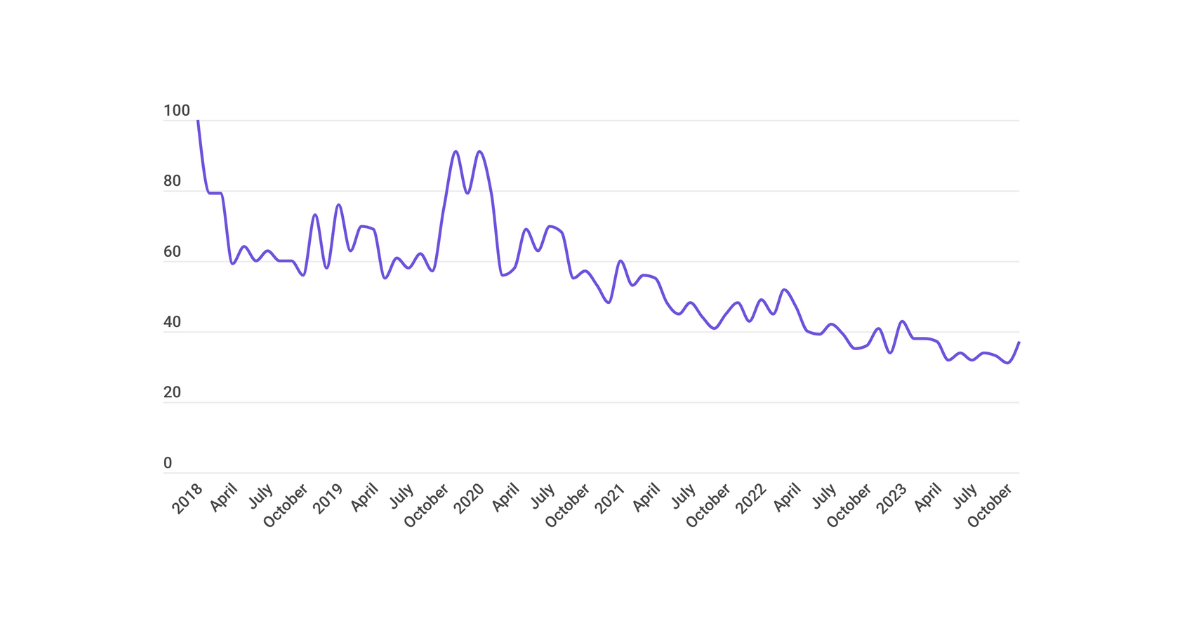World Obesity Day is a worldwide campaign on the 4th March 2023 to address key issues surrounding Obesity. So, we are taking a look at what people are searching for to help tackle obesity and weight loss.
Obviously, not everyone who wants to lose weight are considered obese. For many of us, just dropping a few pounds or managing our weight is necessary to stay healthy and feel better. Also, January is often a popular time that people set themselves weight loss goals. So, as we cruise into March we have taken a look back at levels of search for weight loss related queries and activities.
For a full report on weight loss trends, check out our spotlight on search report here.
Weight Loss Search Trends
Weight loss and it’s related sub-topics are a popular topic on the internet. Obviously, January and summer periods are popular times of the year where people search for information about weight loss.
The trend graph below highlights the seasonal peaks and troughs in the UK but the pattern has remained consistent since 2019.
But with the increase in trends for exercise, particularly from home, we might be starting to see a slow shift towards better lifestyle management for weight loss. I’ll address some of these trends below.

Clinical Interventions for Weight Loss
There has been an increase in search for clinical interventions such as ‘bariatric surgery’. Bariatric surgery is the group term for the various types of weight loss surgery such as gastric band, gastric bypass and sleeve gastrectomy. The NHS would reserve such treatment for people who are diagnosed as clinically obese.
However, there has also been a sharp rise in search for ‘weight loss injections’ in the UK. A number of brands have been made available and their popularity has risen partly due to their ease of access. They are available through prescription only but can be bought from high street pharmacies.


Shift From Diets to Lifestyle Management
There is a decline in search for ‘diet’, however specific search for ‘diet for weight loss’ has maintained a consistent pattern despite a peak during pandemic periods.
There is a shift towards searching more for ‘healthy eating’, ‘meal prep’, ‘healthy recipes’ and seeking out diet plans than there is searching for crash diets.


If you take a look at the top related queries in the UK for ‘diet for weight loss’ in the table below you will see that the search intent is focused more on ‘plans’ than seeking out fad diets, such as ‘meal replacement’ or ‘shakes’.
| Search Query | Index** |
| Diet plan | 100 |
| Diet plan for weight loss | 100 |
| Best diet | 79 |
| Best weight loss diet | 78 |
| Best diet for weight loss | 78 |
| Protein diet | 30 |
| Protein diet for weight loss | 30 |
| Diet food | 20 |
| Keto diet | 17 |
| Diet recipes for weight loss | 15 |
| Weight loss meal plan | 14 |
| Meal plan for weight loss | 14 |
| Best diet plan for weight loss | 14 |
| Free diet plan for weight loss | 14 |
Also, there is a decline in trend towards people seeking out ways in which they can lose weight fast. Although the volume of search per month is high, it does highlight the peoples attitudes are slowly shifting towards sustainable weight loss management rather than the quick fix.

People Still Consider Calories a Major Factor for Weight Loss
Calories has grown in importance for people’s search behaviour towards weight loss. While heavily calorie restricted diets are on the decline people have become increasingly calorie aware. Their search intent highlights that people buy into the concept that a calorie deficit is required for weight loss but increasingly want to achieve it through lifestyle management and healthier eating.
However, intermittent fasting is a weight loss diet that has gained popularity, possibly as a result of this trend. People don’t want to spend long periods of time in significant calorie deficit, but are prepared to make the sacrifice in shorter bursts. Also, celebrity and influencer endorsement of the intermittent fasting diet has also contributed to its popularity.


Search Can Be Very Specific For Weight Loss
People are getting more specific in their search behaviour when it comes to losing weight. The average monthly search for ‘exercise to lose belly fat’ receives an estimate of approximately 7,000 more search volume per month than just ‘exercise to lose weight’. In fact, people there is an estimated monthly volume of 720 to lose thigh fat, 480 for arm fat, 390 for back fat and 260 for hip fat.


What do The Early Trends Indicate For Weight Loss Related Search?
Weight loss search trends are trending up by 22% in February according to google trends, which shows that people are still focused on weight loss goals for 2023.
| Keyword | Average Monthly Search Volume (UK) | Trending (%) * |
| Weight Loss | 60,500 | 22% |
Following the boom of exercise and weight loss during the pandemic periods, the trends show that people are still placing an importance on their weight. With the search trends for weight loss still rising in February, the early signs show that brands that are focused on weight loss can expect to see an increase in search volume.
Content Producers Need to Produce High Quality Content for Weight Loss Related Topics
While weight loss related search queries are very competitive to rank high in organic search there are shifting trends that content producers can try to muscle in on (no pun intended!).
The shift in health and lifestyle management will be a worthwhile focus for content producers. Content for topics such as weight loss advice or best diet type has become saturated. Instead, focus on niche content topics that combines promotion of healthy lifestyles and sustainable weight loss. It’s important that brands that can demonstrate that they have genuine care for their consumers health and well-being when promoting weight loss.
If you are targeting weight loss related keywords then target very specific weight loss queries. I’d recommend conducting in-depth long tail keyword research, where you seek out queries that are 5 words or longer and require answers to very specific questions.
Also, content producers also need to build trust and authority by providing evidence based research to back up their claims and advice. Consumers are savvy online shoppers and increasingly want to see proof and seek reassurance from the content you provide on YMYL (your money or your life) subject matters such as weight loss. Furthermore, collaborating with qualified subject matter experts will offer your consumers qualified guidance and also help to improve content quality.
Check out our Spotlight in Search Report for Weight Loss
In our spotlight on search we provide a review of key online search trends, search behaviours, segmentation and marketing strategy considerations for brands and content producers targeting weight loss audiences. Click here to download the report.
* Trend (%) – Relates to the increase or decrease in volume of search in recent months compared to the avg monthly search volume over the last 12 months
** Index – Google trends provide an index on search popularity on a scale of 1-100 with 100 being the most popular search term for the location an time the data is requested
Data Sources:
- Google trends
- Semrush
- Google ads keyword planner





